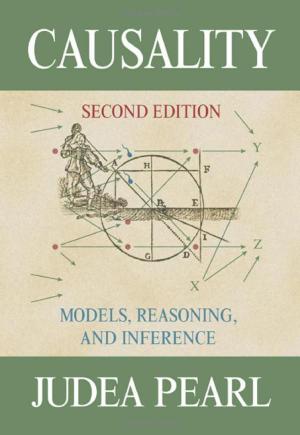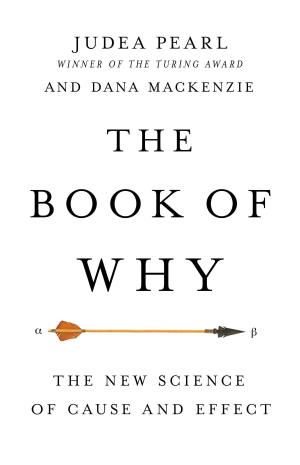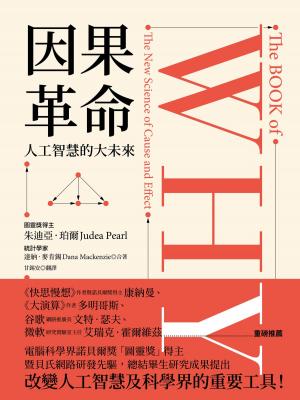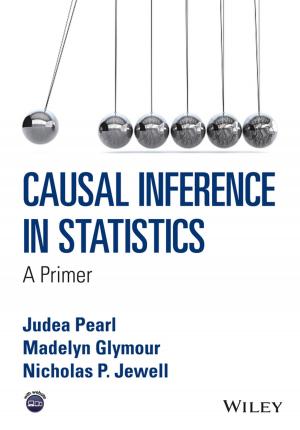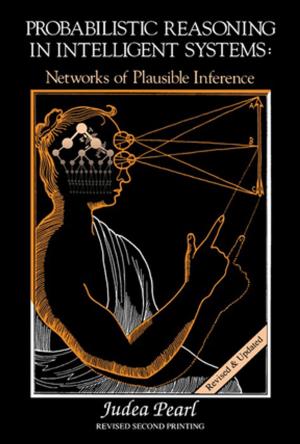朱迪亞‧珀爾 Judea Pearl: 6 books
by Judea Pearl
Language: English
Release Date: September 14, 2009
Language: English
Release Date: September 14, 2009
Written by one of the preeminent researchers in the field, this book provides a comprehensive exposition of modern analysis of causation. It shows how causality has grown from a nebulous concept into a mathematical theory with significant applications in the fields of statistics, artificial intelligence,...
The Book of Why
The New Science of Cause and Effect
Language: English
Release Date: May 15, 2018
A Turing Award-winning computer scientist and statistician shows how understanding causality has revolutionized science and will revolutionize artificial intelligence
"Correlation is not causation." This mantra, chanted by scientists for more than a century, has led to a virtual prohibition...
by Judea Pearl, Ruth Pearl
Language: English
Release Date: January 1, 2004
Language: English
Release Date: January 1, 2004
Being Jewish. What does it meantodayand for the future? Listen in as Jews of all backgrounds reflect, argue, and imagine.When Wall Street Journal reporter Daniel Pearl was brutally murdered in Pakistan, many Jews were particularly touched by his last words affirming his Jewish identity. Many were moved...
因果革命:人工智慧的大未來
The Book of Why: The New Science of Cause and Effect
Language: Chinese
Release Date: June 26, 2019
大數據為什麼不夠聰明?
比機率更強大的思考工具又是什麼?
電腦科學界諾貝爾獎「圖靈獎」得主暨貝氏網路研發先驅Judea Pearl總結畢生研究成果,聯手獲獎的統計學家Dana Mackenzie,提出改變人工智慧及科學界的重要工具!
▎大數據看似厲害,其實有很大的侷限
近幾年大數據當紅,加上它在許多領域的成功運用,其地位與能力備受追捧。與大數據密切相關的統計學,是法蘭西斯・高爾頓與卡爾・皮爾森解答對於遺傳的疑問未果,而開發出來的學科,這門學科創立後興盛數十載,其名言「相關不是因果」影響科學界經常止步於探究「關聯」而非「因果」,並且長期受資料本位的歷史所影響,認為資料無所不能,但是朱迪亞・珀爾希望藉此書告訴讀者,資料本身一點也不智慧。
▎要發展出「強AI」,機率思考仍遠遠不夠
一九八○年代初,朱迪亞・珀爾認為不確定性是AI所欠缺的最重要的能力,於是運用機率開發出強大的推理工具——貝氏網路,因而獲得有電腦科學界諾貝爾獎之稱的「圖靈獎」。貝氏網路是首先讓電腦以灰階方式思考的工具,至今仍極受人工智慧界倚重,然而到了一九八○年代末,珀爾認為貝氏網路仍沒有填補人工智慧和人類智慧的差距,於是他轉而研究如何教AI學會「因果推論」,本書便是整理了歷代科學家推展因果革命的努力與成果。
▎從「求得相關性」的舊階段,邁入「釐清因果關係」的新時代
本書最初幾章是有趣的科學史,探討科學家追求因果解釋的過程如何受挫,以致發展出統計學,並讓統計學方法長期引領學界研究。接著書中有大約一半篇幅,作者以實例示範因果語言(圖示模型)如何解決傳統統計學認為無解的難題,逐一揭示「因果階梯」三大分層的能力(越高的層級,認知挑戰越高,越難理出因果關係),並讓讀者了解因果革命路上諸人的努力與進展,以及這些進展的重要性。本書末尾回頭說明因果革命相對於人工智慧各重要發展面向(比如大數據、深度學習、資料探勘、機器學習等),有何勝出之處、能對它們起什麼正面影響,以及最重要的——「因果革命」將會如何改變人工智慧。
▎「因果革命」不只影響人工智慧,還影響各研究領域
現今機器學習運作時仰賴的是「相關性」,而不是「因果」,如果能成功將因果思考導入電腦,將使電腦變成真正的科學家,使它們成為我們的得力伙伴,提供我們更合理的洞見。由於因果思考可以呈現罪責,電腦能因而具備道德感——「具備道德感的強AI」是因果革命在人工智慧領域的終極追求,作者形容這「是人工智慧給人類的第一個、也是最好的禮物」。
因果性研究還釐清了我們多年來對許多知識本質的不解,改變我們對於眾多問題的認識,這些問題牽涉的層面無所不包,舉凡涉及解讀資料以及根據解釋而採取的作法(像是致病因素、醫療資源分配、公共政策擬定等),都能受益。集結眾多領域學人之力才有如今成果的因果革命,亦將回頭影響整個科學界,珀爾形容它「將使科學的體質更加健全,是人工智慧給人類的第二個禮物」。在美國,因果科學已經開始被大學列入課程……
▎我們強烈建議這些人士閱讀這本書:
(1)資料科學家與大數據研究者,以及對大數據深感興趣的人
(2)統計學家、數學家,電腦科學相關從業人員與學習者
(3)對經濟趨勢與科研發展有興趣的一般大眾
(4)希望培養科學素養,了解最新科學方法的學子
各界盛讚
《快思慢想》作者暨諾貝爾獎得主康納曼、《大演算》作者多明哥斯、谷歌網路推廣長文特‧瑟夫、微軟研究實驗室主任艾瑞克‧霍爾維茲
————重磅推薦!————
◎谷歌網路推廣長文特‧瑟夫:
珀爾近三十年來的學術成就,為人工智慧發展提供堅實的理論基礎……同時把「思考機器」提升到另一個境界。
◎《大演算》作者佩德羅‧多明哥斯:
因果如果不是相關,那又是什麼?拜朱迪亞‧珀爾的劃時代研究之賜,現在我們已能精確回答這個問題。想理解世界如何運行,這本引人入勝且讀來愉快的書是理想的起點。
◎微軟研究實驗室科技研究員及主任艾瑞克‧霍爾維茲:
朱迪亞‧珀爾是人工智慧領域、甚至整個電腦科學界革命的核心人物。
◎諾貝爾經濟學獎得主及《快思慢想》作者丹尼爾‧康納曼...
Causal Inference in Statistics
A Primer
Language: English
Release Date: January 25, 2016
Many of the concepts and terminology surrounding modern causal inference can be quite intimidating to the novice. Judea Pearl presents a book ideal for beginners in statistics, providing a comprehensive introduction to the field of causality. Examples from classical statistics are presented throughout...
Probabilistic Reasoning in Intelligent Systems
Networks of Plausible Inference
Language: English
Release Date: June 28, 2014
Probabilistic Reasoning in Intelligent Systems is a complete and accessible account of the theoretical foundations and computational methods that underlie plausible reasoning under uncertainty. The author provides a coherent explication of probability as a language for reasoning with partial belief...
